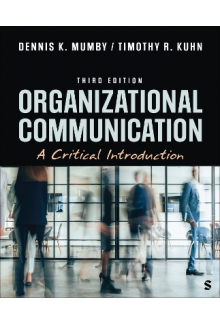- Home
- Academic & Professional Literature
- Humanities
- Organizational Communication: A Critical Introduction
Dennis K. Mumby
Organizational Communication: A Critical Introduction
Voted 0
ISBN: 9781071815779
Author : Dennis K. Mumby
Published: 2025
Publisher: Sage Publications
Number of pages: 464
Language: English
Format: Paperback
Author : Dennis K. Mumby
Published: 2025
Publisher: Sage Publications
Number of pages: 464
Language: English
Format: Paperback
Full price:
210.00 €
- % When buying online
Price:
Whe don't have this product
Delivery in Lithuania within 3-5 weeks. Delay is possible
In stock. Delivery in Lithuania within 1-4 working days
Delivery in Lithuania within 3-5 weeks. Delay is possible
Delivery conditions
Description
"Revising a textbook offers a valuable opportunity for authors to reflect on what they have written in the previous versions. This third edition of our book is no different. But then again, everything's different: the world has changed. Between the second edition and this one, there's been a global pandemic, a worldwide reckoning with legacies of institutionalized racism and settler colonialism, new social movements amid extremely polarized politics, and revolutionary technological shifts, all of which have radically disrupted the world's (and our own) conceptions of the place of work and organizations in our lives. These transformations have been at the front of our minds as we've revised this book. As we thought about what a textbook could accomplish with respect to these changes-what it could provide that would help readers make sense of the world we've made-we thought back to textbooks we were assigned when we were in your position. It's been a long time (decades, in fact) since we were students, butour vague recollections of those days suggest we never much liked those textbooks. Written by professors who assumed that students needed to understand broad academic fields, the textbooks were often stodgy and dry. They stripped away all the passion behind theory, they ignored the important "Why?" and "So What?" questions driving research, and they produced bullet-point lists that students felt compelled to memorize (and then regurgitate on exams). The authors of these tedious tomes were invisible, presenting the topics as if the pages contained nothing other than objective facts. The truth about scholarship, however, is that every theory and program of research you've ever read about in your college career is produced by people. And people have motivations, commitments, and interests, like you. This is not to suggest that research is biased; it's a recognition that scholarship operates according to a set of principles-a perspective, if you like-that shapes the very nature of its knowledge claims. We believe that understanding the principles and aims of a particular research program, and comparing those with alternative principles and aims, isn't only about obscure and dull academic debates; it's about grasping why understanding the world in one way rather than another produces different insights. And when it comes to organizational communication, these varying principles matter greatly because this scholarship is frequently deployed to shape how working, managing, and organizing are done.So, although this book is a survey of the field of organizational communication, including its history and multiple theories and bodies of research, our shared critical orientation shapes our discussion and analysis of the literature. We describe what that means in Chapter 2, but here we should position ourselves and address what brought us to this field and how our experiences shape the critical stance of this book. How we got here matters"--Organizational Communication: A Critical Approach, Third Edition presents a modern, critical perspective while providing a comprehensive survey of theory and research in organizational communication. Authors Dennis Mumby and Timothy Kuhn familiarize students with the field of organizational communication—historically, conceptually, and practically—and challenge them to reconsider their common sense understandings of work and organizations, preparing them for participation in 21st century organizational settings. Linking theory with practice, Mumby and Kuhn skillfully explore the significant role played by organizations and corporations in constructing our identities. The text has been extensively revised, recognizing that the world has changed significantly between editions including the rise of social media, the increasingly networked character of organizational life, the emergence of AI, and more. Critical analysis of the relationship between communication and organization has never been more important, and the updates provide a current look into the critical issues that students will face as they navigate their work lives.
Reviews (0)
Write a review

